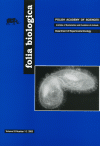
FOLIA BIOLOGICA-KRAKOW
Scope & Guideline
Empowering researchers with pivotal insights in biological sciences.
Introduction
Aims and Scopes
- Molecular and Cellular Biology:
Research focusing on the molecular mechanisms underlying biological processes, including gene expression, cellular signaling, and the impact of environmental factors on cellular functions. - Ecology and Environmental Biology:
Studies examining the interactions between organisms and their environments, including ecological modeling, species distribution, and the effects of climate change on biodiversity. - Genetics and Evolutionary Biology:
Investigations into genetic diversity, evolutionary relationships, and the molecular basis of traits in various organisms, including both wild and domesticated species. - Physiology and Biochemistry:
Research examining physiological processes and biochemical pathways in organisms, often related to health, disease, and environmental stressors. - Conservation Biology:
Studies aimed at understanding and preserving biodiversity, focusing on endangered species, habitat conservation, and the impacts of human activities on ecosystems.
Trending and Emerging
- Microbiome Research:
An increasing number of studies are investigating the role of microbiota in various organisms, indicating a growing interest in understanding the complex relationships between hosts and their microbial communities. - Climate Change Impact Studies:
Research focusing on the effects of climate change on species and ecosystems has gained traction, highlighting the relevance of ecological resilience and adaptation in the face of global environmental changes. - Genomic and Genetic Studies:
There is a notable trend towards genomic analyses and genetic diversity studies across various taxa, reflecting advancements in sequencing technologies and a deeper understanding of evolutionary processes. - Environmental Toxicology:
Emerging themes in environmental toxicology are evident, with studies increasingly exploring the effects of pollutants and environmental stressors on health and biodiversity, underscoring the journal's commitment to addressing contemporary environmental issues.
Declining or Waning
- Traditional Taxonomy:
While taxonomic studies remain important, there has been a noticeable decrease in the number of papers solely focused on taxonomic classification as researchers increasingly emphasize ecological and genetic approaches. - Invasive Species Studies:
Although invasive species research was previously a prominent theme, recent publications indicate a decline in focus on this area, possibly due to shifting research priorities towards broader ecological impacts and conservation strategies. - Animal Behavior Studies:
Research specifically addressing animal behavior has seen a reduction in publications, as the journal's emphasis appears to be shifting more towards molecular and ecological perspectives. - Historical Biogeography:
Studies focused on historical biogeographical patterns are less frequent, suggesting a waning interest as the journal pivots towards contemporary ecological challenges and genetic analyses.
Similar Journals

Biology-Basel is a premier, peer-reviewed open-access journal published by MDPI since 2012, situated in the heart of Switzerland. With an E-ISSN of 2079-7737, this journal serves as a vital platform for the dissemination of innovative research across the broad spectrum of Agricultural and Biological Sciences, Biochemistry, Genetics, Molecular Biology, and Immunology. Recognized for its rigorous editorial standards and impactful findings, it currently ranks Q1 in Agricultural and Biological Sciences and holds impressive positions in several categories according to the 2023 Scopus rankings. The journal’s open-access model ensures that high-quality research is freely available to a global audience, fostering collaboration and knowledge sharing among researchers, professionals, and students alike. Spanning from 2012 to 2024, Biology-Basel is committed to reflecting the latest advancements in biological sciences, making it an essential resource in the ever-evolving landscape of biological research.
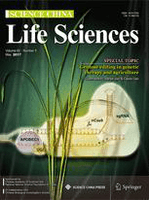
Science China-Life Sciences
Empowering global science through open access and innovation.Science China-Life Sciences, published by SCIENCE PRESS, is a premier academic journal that stands at the forefront of innovative research and discoveries in the fields of life sciences, spanning crucial areas such as agricultural and biological sciences, biochemistry, genetics, molecular biology, and environmental science. With an impressive Q1 ranking in its respective categories—ranked #5 in Agricultural and Biological Sciences, #7 in Environmental Science, and #17 in Biochemistry, Genetics and Molecular Biology—this journal is recognized for its rigorous peer-review process and significant impact within the scientific community, as reflected in its high percentiles (97th and 92nd). Maintained as an Open Access publication, it ensures broad dissemination and accessibility of research findings, fostering collaboration and knowledge sharing among researchers, professionals, and students alike. Given its position in the research landscape and its commitment to high-quality scholarship, Science China-Life Sciences plays a vital role in advancing life sciences research, supporting scientists in addressing global challenges through innovative biological solutions.
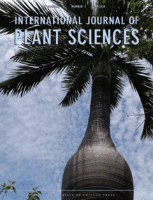
INTERNATIONAL JOURNAL OF PLANT SCIENCES
Cultivating excellence in plant research and publication.The INTERNATIONAL JOURNAL OF PLANT SCIENCES, published by UNIV CHICAGO PRESS, is a leading journal dedicated to advancing knowledge in the fields of plant sciences and ecology. With an ISSN of 1058-5893 and an E-ISSN of 1537-5315, this journal has been a prominent platform for groundbreaking research since its establishment, featuring works from 1983 to present. It holds an impressive Q2 ranking in both Ecology, Evolution, Behavior and Systematics and Plant Science, reflecting its reputable standing within the academic community. The journal is well-regarded for its rigorous peer-review process and commitment to high-quality publication standards, making it a favored choice for researchers, students, and professionals eager to engage with the latest findings and innovative methodologies in plant research. While it does not currently operate under an Open Access model, the journal provides ample access options for institutions and individuals keen to explore its curated content. By presenting diverse studies that blend theoretical and practical insights, the INTERNATIONAL JOURNAL OF PLANT SCIENCES plays a critical role in fostering interdisciplinary dialogue and advancing the frontiers of plant science research.
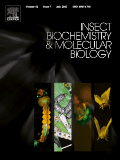
INSECT BIOCHEMISTRY AND MOLECULAR BIOLOGY
Exploring Molecular Pathways in EntomologyINSECT BIOCHEMISTRY AND MOLECULAR BIOLOGY, published by Pergamon-Elsevier Science Ltd, stands at the forefront of interdisciplinary research focusing on the biochemical and molecular processes in insects. This esteemed journal, with an ISSN of 0965-1748 and E-ISSN of 1879-0240, serves as a vital resource for scientists and researchers interested in the intricacies of insect physiology and genetics. With a significant presence in the academic community, it holds impressive rankings, including Q2 in Biochemistry and Q1 in Insect Science according to the latest quartiles, reflecting its critical role in advancing knowledge in these fields. The journal's convergence of content from 1992 to 2024 illustrates its commitment to fostering long-term scholarly discourse. Researchers will appreciate its impact within the Agricultural and Biological Sciences and its contributions to understanding the molecular biology of insects. Although not an open-access journal, it provides complementary insights into the biochemistry and genetics of insects, making it indispensable for anyone keen on pushing the boundaries of entomological science.

Journal of Biological Research-Bollettino della Societa Italiana di Biologia Sperimentale
Transforming Biological Discoveries into Global KnowledgeThe Journal of Biological Research-Bollettino della Societa Italiana di Biologia Sperimentale is a premier peer-reviewed journal published by PAGEPRESS PUBL, focusing on a diverse array of topics within the broad field of biological research. Established as an Open Access journal since 2009, it facilitates the dissemination of scientific knowledge across the globe, enhancing visibility and accessibility for researchers, professionals, and students alike. With an ISSN of 1826-8838 and E-ISSN 2284-0230, this journal serves as a platform for innovative studies in Biochemistry, Genetics, and Molecular Biology, with a growing emphasis on Plant Science. Although currently categorized in the Q4 quartile for various sub-disciplines, the journal is dedicated to fostering interdisciplinary collaboration and advancing research quality. The latest Scopus rankings indicate a burgeoning presence in the academic community, positioning itself at significant ranks within the fields it covers. With publication coverage extending from 2011 to 2024, the journal aims to push the frontiers of biological research while adapting to the evolving demands of the scientific community.

BIOLOGY BULLETIN
Advancing Biological Insights for a Sustainable Future.BIOLOGY BULLETIN is a prominent academic journal published by PLEIADES PUBLISHING INC, dedicated to advancing the fields of Agricultural and Biological Sciences as well as Biochemistry, Genetics, and Molecular Biology. With an ISSN of 1062-3590 and E-ISSN of 1608-3059, the journal has been a vital resource for researchers and professionals since its commencement in 1996. Located in the United States, BIOLOGY BULLETIN operates within a highly competitive academic landscape, achieving a 2023 ranking in the Q3 quartile for Agricultural and Biological Sciences and Q4 for Biochemistry, Genetics, and Molecular Biology, highlighting its commitment to delivering impactful research despite its challenges. Researchers seeking to publish their findings will find a platform for significant insights, as reflected in its Scopus rankings, where it stands at #183 and #199 out of 221 in its respective categories, showcasing opportunities for growth and visibility. While currently not an open-access publication, BIOLOGY BULLETIN plays a crucial role in facilitating scholarly communication and fostering an understanding of biological sciences, making it an essential read for academics, professionals, and students alike.

INDIAN JOURNAL OF EXPERIMENTAL BIOLOGY
Illuminating Pathways in Experimental ResearchINDIAN JOURNAL OF EXPERIMENTAL BIOLOGY, published by the NATL INST SCIENCE COMMUNICATION-NISCAIR, stands as a significant platform for the dissemination of original research in the fields of biochemistry, genetics, and molecular biology, particularly within the context of Indian scientific advancements. With its ISSN 0019-5189 and E-ISSN 0975-1009, the journal has been an essential resource since its inception in 1965, although coverage in prominent databases like Scopus was discontinued in 2018. The journal ranks in the 57th percentile for Biotechnology, as well as in the 27th and 25th percentiles for Molecular Biology and Cell Biology respectively, underscoring its impact and relevance. While currently not an Open Access journal, it continues to provide valuable insights and contributions from researchers and professionals in the growing field of experimental biology. The esteemed contributions published in this journal enhance our understanding of biological processes and foster the development of innovative solutions to contemporary challenges in health and environmental science.

Cold Spring Harbor Perspectives in Biology
Empowering Researchers with Cutting-edge PerspectivesCold Spring Harbor Perspectives in Biology is a prestigious academic journal published by COLD SPRING HARBOR LAB PRESS that serves as a vital resource in the fields of Biochemistry, Genetics, and Molecular Biology. With an impressive impact factor and categorized in the Q1 quartile for its contributions, this journal is renowned for curating comprehensive reviews that synthesize the latest advancements and ongoing research in these dynamic and interconnected disciplines. Since its inception in 2009, the journal has played a pivotal role in advancing scientific knowledge through high-quality articles that cater to researchers, professionals, and students alike. Although it operates on a traditional subscription model, its contributions are indispensable for those seeking to remain at the forefront of biological research and its myriad applications. With a commendable ranking of #19 out of 221 in general biochemistry, genetics, and molecular biology on Scopus, this journal ensures that its readers have access to cutting-edge insights and a rigorous academic discourse.
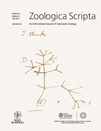
ZOOLOGICA SCRIPTA
Connecting researchers through rigorous peer-reviewed insights.Zoologica Scripta, published by Wiley, stands as a distinguished journal within the fields of Animal Science and Zoology, Ecology, Evolution, Behavior and Systematics, Genetics, and Molecular Biology. With its inception dating back to 1971 and a convergence year extending to 2024, this journal consistently provides a platform for high-quality research, earning a Q1 ranking in two key categories and solid performance in additional fields, as evidenced by its significant Scopus rankings and impressive percentiles. Notably, it ranks 36 out of 490 journals in Animal Science and Zoology, placing it in the 92nd percentile. While Zoologica Scripta operates under a traditional access model, its rigorous peer-review process ensures that only the most impactful studies make their way into its pages. With a focus on advancing our understanding of biodiversity and evolutionary processes, this journal is indispensable for researchers, professionals, and students committed to the ongoing exploration of animal sciences and ecological studies.

PAKISTAN JOURNAL OF ZOOLOGY
Exploring the depths of animal science and conservation.Pakistan Journal of Zoology, established in 1975 and published by the Zoological Society of Pakistan, is a pivotal resource in the field of zoology and animal science, contributing to the academic discourse and research advancements in the region. With an ISSN of 0030-9923, this journal strives to disseminate innovative research findings and scholarly articles that explore various facets of animal biology, ecology, and conservation. Although classified in the Q4 quartile within the animal science category, its commitment to providing a platform for emerging researchers makes it crucial for those in the zoological community. The journal covers a broad range of topics relevant to contemporary issues in zoology, promoting both local and international collaborations. Situated in Lahore, Pakistan, its contributions are vital for promoting biodiversity awareness and conservation efforts within the region. Accessible research outputs empower students and professionals alike to engage in critical discussions and applications within the disciplines of zoology and animal science.